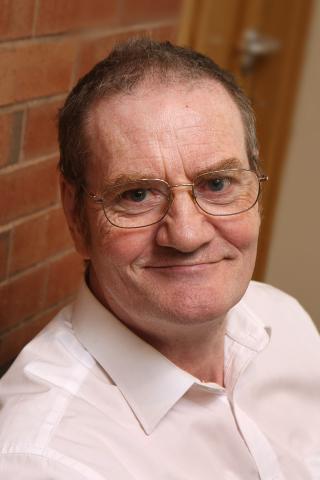AAA event highlights need for men to get life-saving test

An Abdominal Aortic Aneurysm (AAA) is a potentially fatal condition which can particularly affect older men, but can be detected with a simple ultrasound screening test. In Northern Ireland the AAA Screening Programme offers this test to men in the year they turn 65. The success of the programme, in detecting and successfully managing this condition, has been highlighted at an event in Belfast attended by men who have benefitted from the programme.
The aorta is the main artery that supplies blood to the body, and runs from the heart down through the chest and abdomen (belly). As some people get older, the wall of the aorta in the abdomen can become weak and balloon out to form an aneurysm, like a bulge in a worn tyre. This is called an abdominal aortic aneurysm which can be fatal if it ruptures.
The AAA Screening Programme’s seventh consecutive annual service user event in Belfast brought together a wide range of healthcare professionals and men, screen-detected with an AAA, along with their partners/ guests. The aim of the morning event was to encourage service users to share their experiences of the screening programme and treatment services and to consider how they can be further developed.
Dr Stephen Bergin, Acting Assistant Director of Public Health for Screening and Professional Standards at the Public Health Agency, said: “Each year around 80 to 100 people in Northern Ireland die from a ruptured abdominal aortic aneurysm. Most people with the condition will be unaware that they have an aneurysm as they rarely have symptoms, but it is often life-threatening if it ruptures.”
Men over 65 who have not been screened before can phone the screening office and request a screening appointment on (028) 9063 1828. The programme, which was introduced in July 2012, provides screening at 24 different locations.
“The event provided an opportunity for those involved in the delivery of AAA screening services to take stock and consider feedback from the programme’s service users; this feedback is integral in identifying priorities that will shape the future of the programme in Northern Ireland,” said Dr Bergin.
“Although 83% of those invited for screening attend, we cannot afford to be complacent. Ideally, all men invited for screening should attend this potentially life-saving test. The AAA screening check is a quick, simple, painless ultrasound scan provided free of charge. Men who have an AAA detected will, depending on the size of the aneurysm, either be monitored with surveillance scans or referred to the specialist vascular team to consider treatment options.”
Research shows that men are six times more likely to have this type of aneurysm than women and the chance of having one increases with age. The good news is that if an aneurysm is detected early it can be monitored and, if necessary, treated. Screening men aged 65 using an ultrasound scan reduces the death rate from ruptured AAAs by around 50%.
William Craig (65), who was detected with a small AAA, urged other men to go for screening when called.
“I had never heard of AAA screening,” said William, who is from Ballygowan.
“In fact I didn’t know what an AAA was before I received the invite. I had no intention of attending the screening and was going to dispose of the leaflet, but my wife, Margaret, who read the leaflet in great detail, persuaded me to attend.
“The test itself involved me simply lifting my shirt whilst a hand-held ultrasound scanner was moved over my lower chest and abdomen. The procedure was quick, painless and the knowledgeable staff very pleasant. I highly recommend the screening programme. The staff were very helpful in explaining exactly what an AAA was. I’m so glad I went,” he added.
Those eligible for screening will receive an invitation leaflet in the post at the home address provided by their GP. It is therefore important that your GP has your most up-to-date address and correct date of birth, as you may miss the chance to take part in the programme if these are inaccurate.
The risk of having an abdominal aortic aneurysm can also increase if:
• You smoke;
• You have high blood pressure;
• Your brother, sister or parent has, or has had, an abdominal aortic aneurysm.
To date almost 59,000 men have benefitted from the screening programme and almost 900 aneurysms have been detected.
For further information visit www.nidirect.gov.uk and search AAA screening.
ENDS
